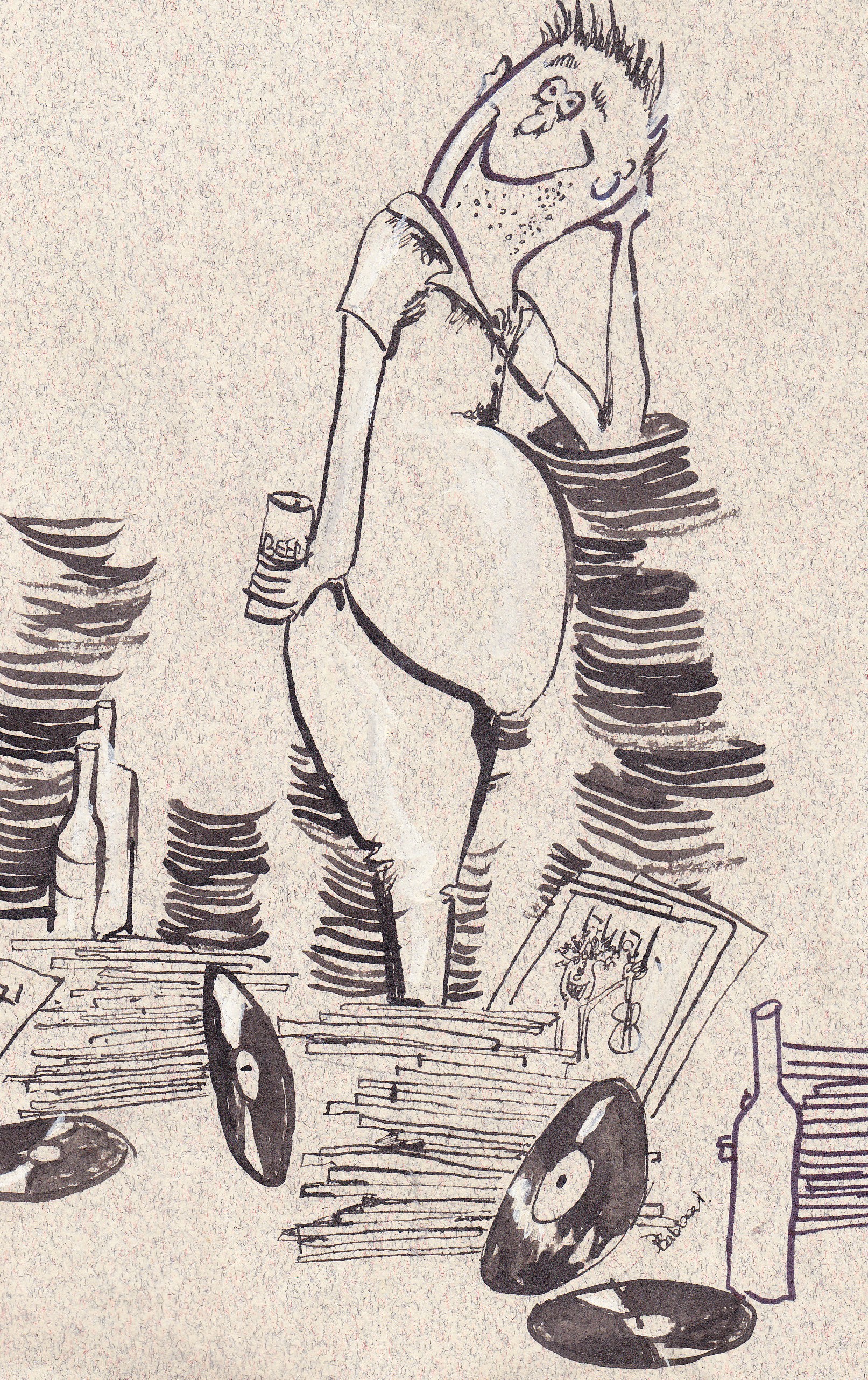- Vinyl-Records>
- Which British bands led the second wave, making the biggest impact!
- Paul McCartney and Wings
Paul McCartney
and
Wings
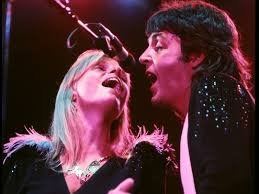 Paul McCartney and Wings onstage. Wife and keyboard player Linda harmonizing during the 1976 world tour
Paul McCartney and Wings onstage. Wife and keyboard player Linda harmonizing during the 1976 world tourPaul McCartney and Wings, the controversial band the critics disliked, but proved to be a great band
I admit to being a late starter in being a fan of Paul McCartney and Wings. At the time Paul put Wings together, it was thought there was no way an ex-Beatle could ever put together a band that would come near to The Beatles. And Linda in the band? Instead of John? No way! And this was this was the general opinion at the time. It was a very anti Paul time, with his early solo stull “McCartney” and “Ram” receiving generally negative reviews from the public and press. But Paul McCartney and Wings had other ideas.
“McCartney”, coming out in April 1970, largely recorded at home by Paul
and Linda alone, got to No.2 in the U.K., where it stayed for 3 weeks. In the
U.S., by 15May, the album had sold over 1million copies, and from 23 May, held
No.1 on the Billboard charts for 3 weeks.
The next album “Ram” was recorded mainly in New York come out in May 1971. This was credited to Paul and Linda alone, but also featured guitarist David Spinozza, Drummer Denny Siewell, and guitarist Hugh McCulloch. This is where Paul started to think about working with a band again.
Again, badly received by press, and in particular his former Beatle bandmates, (especially John) the album did well. It got to No. 1 in the U.K. and No. 2 on the U.S. Billboard chart. The album has grown in status since, and several reissues score well.
After “Ram” Paul invited Deni Siewell, and Hugh
McCulloch to form his new band. McCulloch declined; Siewell agreed.
Paul McCartney and Wings Get Together
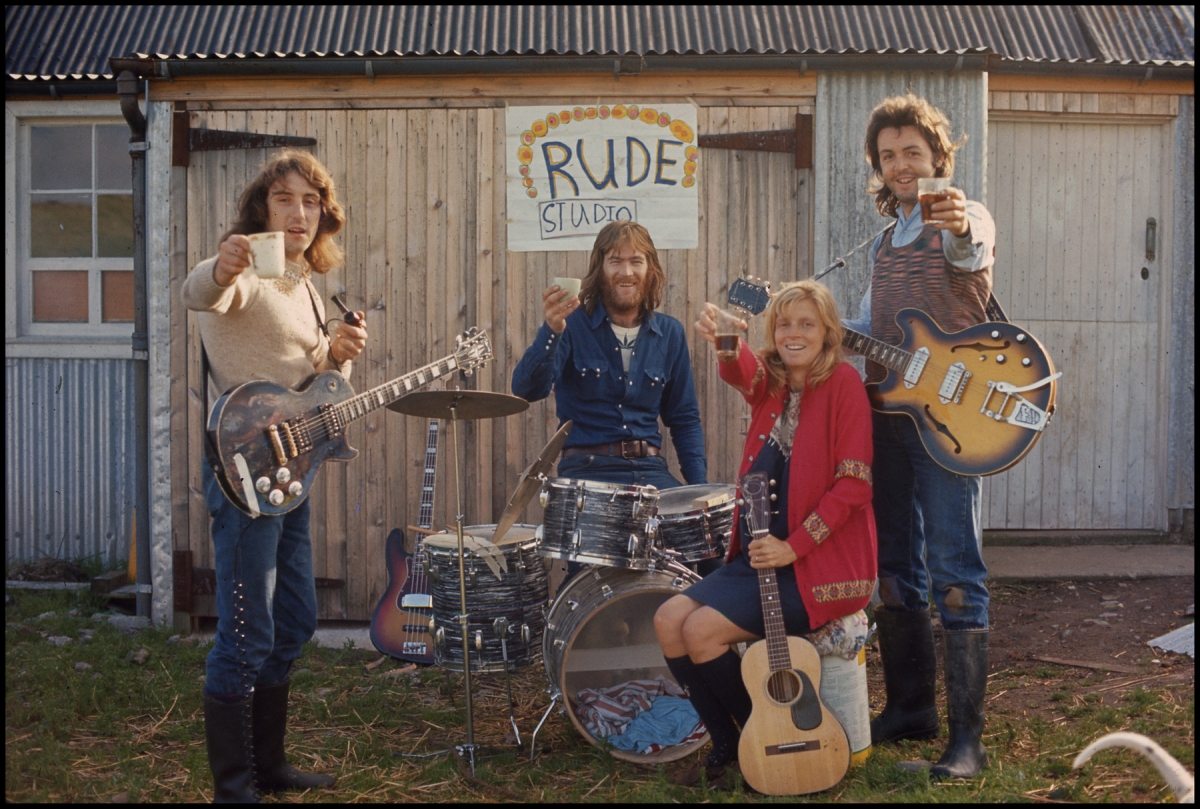 Paul McCartney and Wings at Paul's Rude Studio, recording wings "Wild Life" album. (L to R) Denny Laine, Denny Seiwell, Linda and Paul, 1971
Paul McCartney and Wings at Paul's Rude Studio, recording wings "Wild Life" album. (L to R) Denny Laine, Denny Seiwell, Linda and Paul, 1971Paul then contacted his old mate from The Moody Blues, Denny Laine. Denny dropped his current project and joined Paul and Linda. The band, named Paul McCartney and Wings, or just Wings, immediately convened at Paul's recording studio in Scotland, named Rude. Here they quickly rehearsed the songs that would become “Wild Life”. The album was done in under a week, the idea being to create a spontaneous approach to their music.
The album, of course, received a mediocre reception when released on December 7th in both the U.S., and U.K. It was “rushed, defensive, badly timed and overrated”. But it went to No. 10 on Billboard, No. 5 on the Cashbox chart, and 11 in the U.K. Down here in Australia, it reached No.3.
Paul McCartney and Wings then toured the album, piling into a bus, stopping wherever they thought looked good, and sought out gigs where they could find it. "Dear Friend", recorded during the Ram sessions, was apparently an attempt at reconciliation with John Lennon. It followed Lennon's attack on McCartney in the song "How Do You Sleep?", from the album Imagine, which had been in retaliation for McCartney's perceived digs at Lennon in "Too Many People" on Ram. Music critic Ian MacDonald cited "Dear Friend" as a counterargument to the caricature of McCartney as an emotional lightweight.
“Wild Life” also included a reggae remake of Mickey & Sylvia's 1957 top 40 hit "Love Is Strange". A promotional single was distributed in the UK by Apple in December 1971 with catalogue No. R5932, but the commercial release was cancelled due to poor album sales.
“Red Rose Speedway” followed, released in April 1973. Credited to Paul McCartney and Wings, the single “My Love” came off the album as a single and featured a great guitar solo by recently recruited Henry McCulloch.
Again, heavily criticized by the press, eg "Quite possibly the worst album ever made by a rock and roller of the first rank", “lightweight”, “vacuous and facile” (!). But one critic liked it, Tony Tylor in the NME noted “with all the current heaviness and after-me-the-apocalypse brain studs around, I for one am bloody pleased to discover a lightweight record that not only fails to alienate, but actually succeeds in impressing via good melodic structure, excellent playing and fine production."
Wings Back to a Trio
Eventually, the album reached No.5 on the UK charts, No. 1 in the U.S., and No.1 in Australia. As Paul and Linda prepared for the next album, Paul and Henry McColloch had a disagreement, some say over money, some over different opinions on guitar playing. He packed up his guitar and left.
Paul Linda and Denny were planning on heading to Lagos to do the next album. Drummer Denny Siewell was not so keen without a full band, so he bowed out as well.
Paul’s response? “Let’s make an album they wish they were on!”
And they did! This is when Paul McCartney and Wings at last earned some credibility.
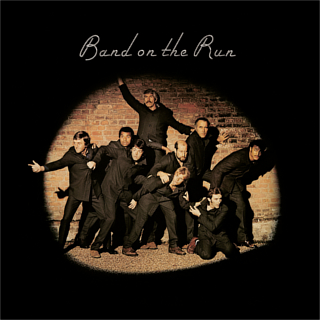 Paul McCartney, Linda and Denny Laine, along with: Michael Parkinson, Kenny Lynch, James Coburn, Clement Freud, Christopher Lee and John Cornish, pose for the cover of "Band On The Run"
Paul McCartney, Linda and Denny Laine, along with: Michael Parkinson, Kenny Lynch, James Coburn, Clement Freud, Christopher Lee and John Cornish, pose for the cover of "Band On The Run"“Band On the Run” was recorded between August and October 1973 at EMI and ARC in Lagos, Nigeria. Released in the U.K. 30 November, and U.S. December 5, it received mostly favorable reviews. Author Robert Rodriguez wrote of the album, "It was exactly the record fans and critics had long hoped he would make …", Rolling Stone named Band on the Run one of the Best Albums of the Year for 1973.
And this is the album that got me in to Wing. Strangely, it was at a Status Quo concert here in Adelaide. While waiting for the bands to start, music was played over the P.A system, and that’s when I heard “Band on the Run”.
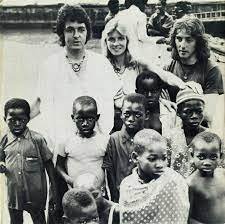 On location in Lagos with some of the locals. Paul, Linda and Denny take a break from the recording sessions.
On location in Lagos with some of the locals. Paul, Linda and Denny take a break from the recording sessions.The album was a slow starter commercially, getting to No.9 in the U.K. on 22 December, where it stayed for two weeks before dropping to No.9. In the U.S. Billboard to No 7 in February ’74 then went to the lower 10’s of the chart. Because of this lack of performance, Paul was convinced singles from the album should be released.
"Jet" was issued on 28 January in America. In the U.K, it was released on 15 February. The single's success provided new impetus for the album, which hit number 2 in the UK at the end of March and topped Billboard's listings on 13 April. Apple issued "Band on the Run" on 8 April in America, the UK release followed on 28 June,
Due
to the popularity of "Band on the Run” single, the album returned to number 1 on
Billboard on 8 June, when the single simultaneously topped the Hot 100. In
Britain, the album finally hit number 1 on 27 July, for the first of seven
consecutive weeks at the top. During that time, its chart performance similarly
reflected the popularity of the two singles, with the album spending three
weeks at number 2 in April, and six weeks at number 1 throughout August and the
first week of September. Not bad really!
The album topped the Billboard chart on three separate occasions during 1974,[60] and was the top selling album of that year in Australia and Canada. In Britain, it came second in the year-end standings, behind the compilation "The Singles: 1969–1973" by the Carpenters.
Paul McCartney and Wings New Line-Ups, and New Albums.
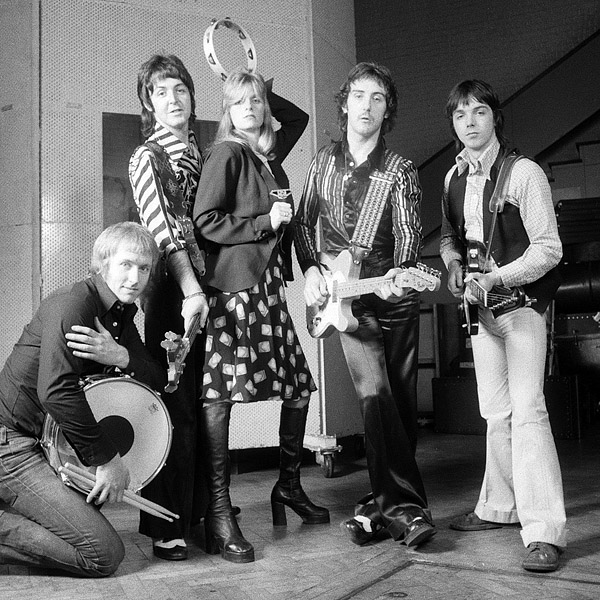 The new line up for the new album. Geoff Britton on drums, Paul, Linda, Denny and new guitarist, Jimmy McCulloch.
The new line up for the new album. Geoff Britton on drums, Paul, Linda, Denny and new guitarist, Jimmy McCulloch.Following that album, the band recruited guitarist Jimmy McCulloch and drummer Geoff Britton, only for Britton to quit shortly afterwards and be replaced by Joe English. With the new line-up, Wings released 1975's Venus and Mars, which included the US number one single "Listen to What the Man Said” and undertook a highly successful world tour over 1975–76.
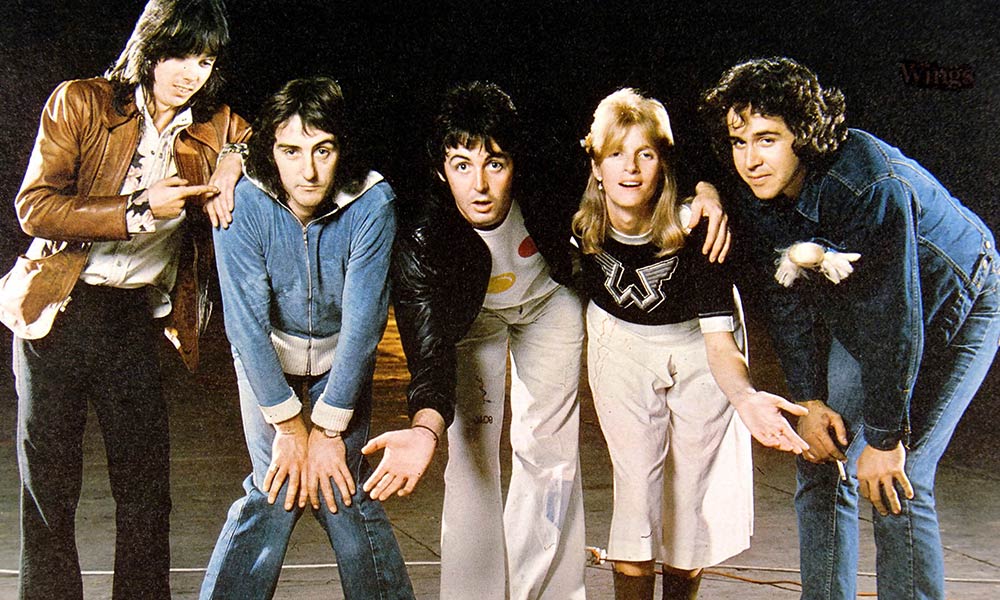 The line up for the "Venus and Mars" album. Guitarist Jimmy McCulloch, Denny Laine, Paul, Linda, and drummer Joe English
The line up for the "Venus and Mars" album. Guitarist Jimmy McCulloch, Denny Laine, Paul, Linda, and drummer Joe EnglishThat was the line up that I saw in Adelaide, and they were absolutely superb. One of the best shows I have seen.
The “Venus and Mars” album was great. Due to Paul just re-signing with EMI at an increased royalty rate, the price of the record went up a bit. But that did not stop buyers from jumping on the album, which was one of the best sellers in my shop at the time.
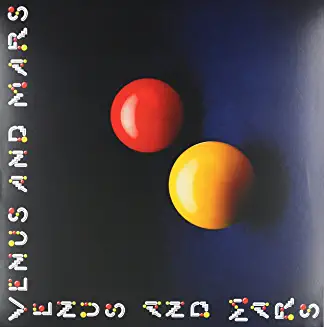
Preceded by the single "Listen to What the Man Said" in May 1975, Venus and Mars appeared two weeks later to generally favorable reviews and brisk sales. The album got number 1 in the United States, the United Kingdom and other countries around the world (as did "Listen to What the Man Said" in the US) and sold 4 million copies worldwide. The reaction, though mainly positive, was less than what had greeted "Band on the Run" a year earlier.
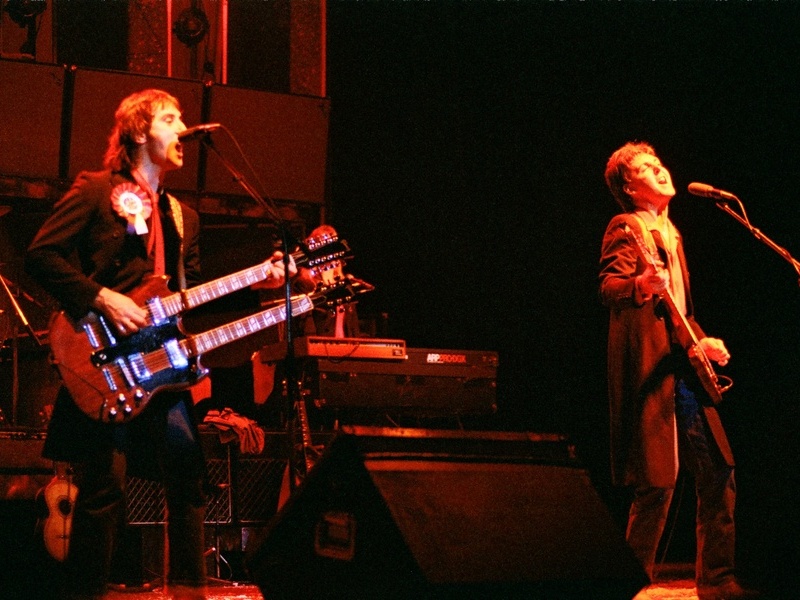 Complete with Denny Laine in duel neck guitar, Paul sings with Denny on the ex-Moody Blues guitarist son "Go Now"
Complete with Denny Laine in duel neck guitar, Paul sings with Denny on the ex-Moody Blues guitarist son "Go Now"“Wings at the Speed “of Sound was next, released on 25 March 1976. (Or as one columnist down here in Oz called it, “Wings At The Speed of a Snail)
This came out at the height of the band's popularity, and it reached the top spot on the US album chart—the band's fourth consecutive album to do so—and peaked at number 2 on the UK album chart. Both singles from the album also reached the top 5 of the UK and US singles charts, with "Silly Love Songs" reaching number 1 in the US.
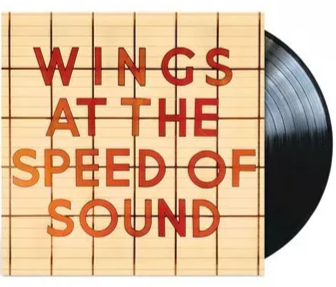
The album was recorded and released during Wings' highly successful Wings Over the World tour, with songs from the album performed on the tour after its release. Subsequently, performances of "Let 'Em In", "Time to Hide", 'Silly Love Songs' and "Beware My Love" (the best song on the album) were included on forthcoming the live album “Wings over America”, released in December 1976.
As a reaction to critics who believed Wings was merely a vehicle for Paul McCartney, the album featured every member of the band taking lead vocals on at least one song, and two songs from the album are written or co-written by band members other than the McCartney’s.
So, Denny Laine contributing “The Note You Never Wrote”, Linda gave us “Cook of the House” and Joe English came up with “Must Do Something About It”.
Although again receiving a lukewarm reception, the album reached number 2 in the United Kingdom (and was the 4th best-selling album of 1976). It became McCartney's most successful American chart album since his days in The Beatles, spending seven non-consecutive weeks at number 1 throughout the summer (and blocking the new Beatles compilation Rock 'n' Roll Music, which reached number 2). "Wings at the Speed of Sound" sold 3.5 million copies worldwide.
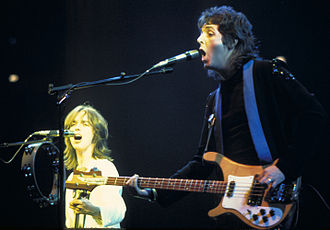 Jimmy McCulloch harmonizes with Paul during the 1975 World Tour.
Jimmy McCulloch harmonizes with Paul during the 1975 World Tour.“London Town”, their sixth studio album, was released in March 1978, two years after its predecessor. The album had a long and tumultuous gestation during which the band's tour plans for 1977 were cancelled, due to Linda becoming pregnant with their third child and two members of Wings having departed.
Drummer Joe English had become homesick for his hometown in America, and lead guitarist Jimmy McCulloch left to join the Small Faces that September. Jimmy died on September 29, 1976, by heart failure brought on by alcohol and morphine abuse.
So, for the first time since 1973's “Band on the Run” Wings were down to the core three of Paul, Linda, and Denny Laine Recording sessions were held intermittently over a period of a year, mainly at Abby Road Studios in London and aboard a luxury yacht in the Virgin Islands.
"London Town" charted in the top five positions in the UK and the US. It failed to repeat the success of Wings' three previous albums, however, and received mostly unfavorable reviews from music critics. The lead single, "With A Little Luck", was a number 1 hit in the US, but the album's subsequent singles achieved only minor chart success. Also recorded during the sessions was the 1977 non-album single “Mull of Kintyre", which, until 1984, was the best-selling single in UK chart history.
London Town received generally unfavorable reviews from music critics. In the charts, it peaked at number 4 in the UK and number 2 in the US, where it sold over one million copies and went platinum. After a strong start initially, however, it lacked the staying power of Wings' previous releases. The album's follow-up singles, "I've Had Enough" and the title track, became relatively minor hits. The album marked the end of Paul McCartney and Wings' commercial peak and the beginning of a minor commercial slump for McCartney.
Paul McCartney was reportedly displeased with Capitol Records in the US, where "Mull of Kintyre" was ignored by radio programmers; its B-side, "Girls School", reached only number 33 on the US charts. He was further dismayed at what he viewed as Capitol's lackluster promotion for London Town. With his contract at an end, he signed up with Columbia Records for North America (remaining with EMI elsewhere in the world) and would stay there until 1984, before returning to Capitol in the US
The album was certified platinum in Australia on the day of its release.
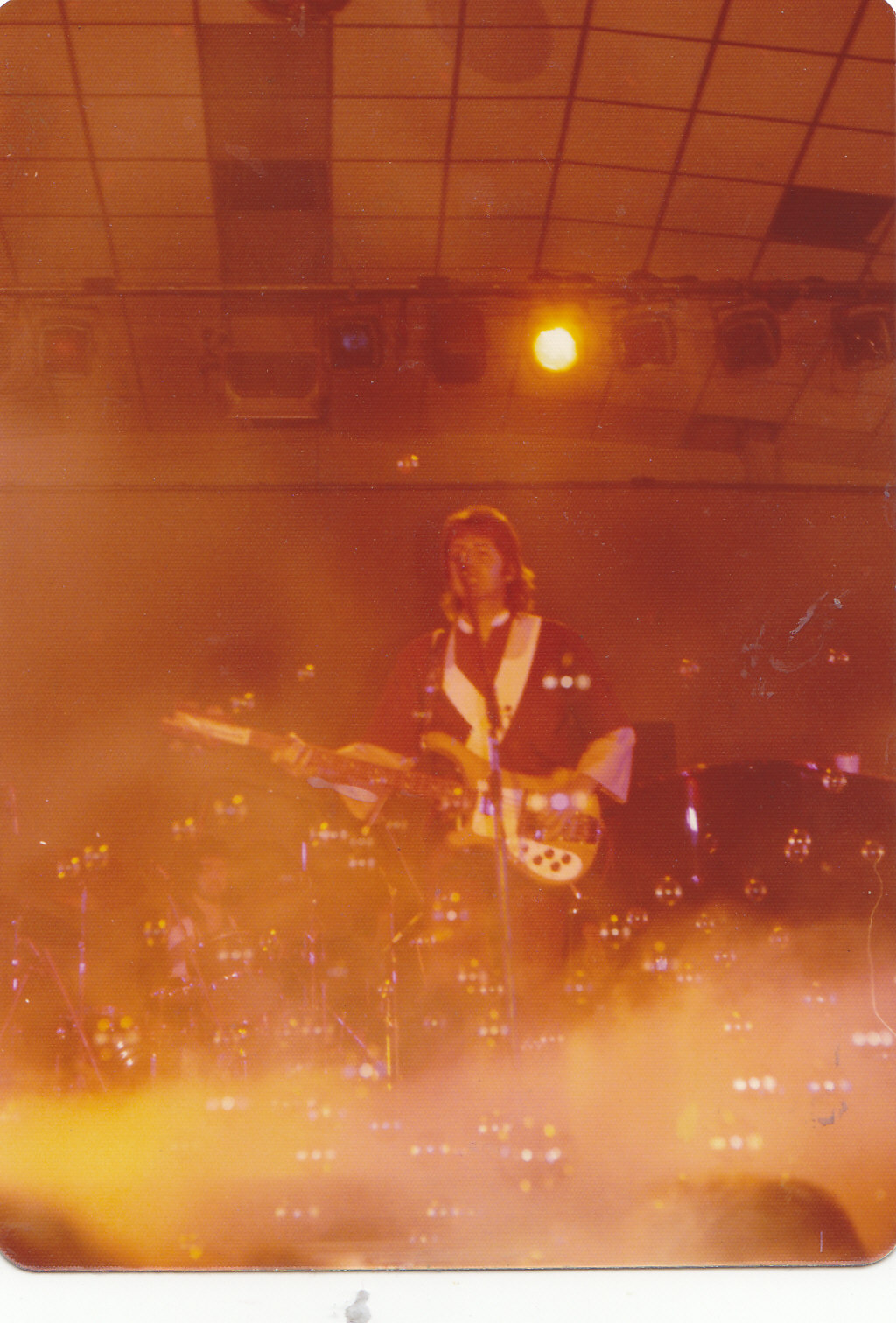 Paul in Adelaide with left handed Rickenbacker bass.
Paul in Adelaide with left handed Rickenbacker bass.Surrounded by a shower of rainbow colored bubbles, Paul and his Wings rip into the opening song at Apollo Stadium, Adelaide November 1975. A medley of "Venus and Mars", "Rock Show" and "Jet".
Joe English, in the background, providing the beat behind the drums.
The band did two sell out shows here in Adelaide,.
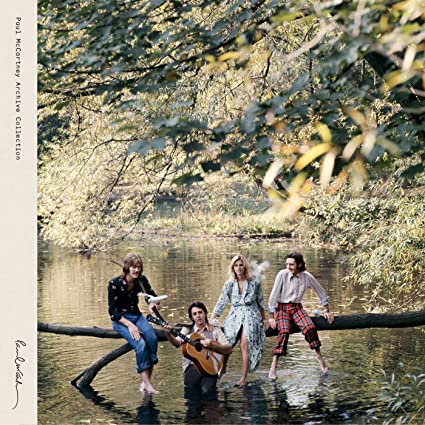
The "Wild Life" Album.....
The first Wings album, coming out in December 1971. As was the trend it received a pretty cool reception, but reached No. 11 on the UK charts and No. 6 on Cashbox. Even better down here in Oz it got to No. 3. "Wild Life" has 10 tracks, including "Mumbo", "Love is Strange" "Some People Never Know" and "Wild Life".
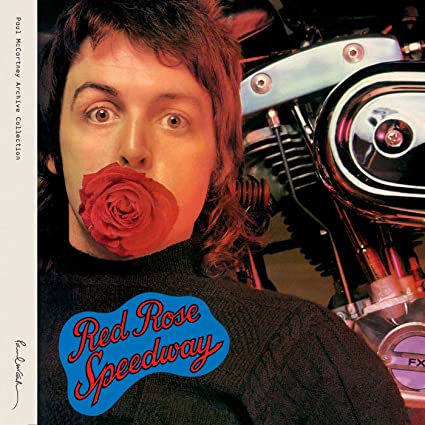
Red Rose Speedway
With the disappointment of "Wild Life", the next album featured just Paul on the cover, and given credit to "Paul McCartney and Wings" The album, coming out in April 1973, had the single "My Love" issued prior to the album. This helped get the "Red Rose" to number 5 on the UK Albums Chart and number 1 on the Billboard Top LPs & Tape chart in the US, while "My Love" topped the US Billboard Hot 100. Although a commercial success, the album was given a mixed response by music critics, with several reviewers considering the songs to be inconsequential and mediocre. Decades later, it continues to receive mixed reviews.
The release of Paul McCartney and Wings’ Red Rose Speedway as a limited edition half-speed mastered vinyl LP was recently announced. The 50th Anniversary pressing was made available from April 22 for Record Store Day 2023, days before the actual anniversary of the album’s original April 30, 1973 release date.
The first Paul McCartney and Wings album to top the US album chart, Red Rose Speedway kicked off a run of #1 albums that included Band On The Run, Venus And Mars, At The Speed Of Sound and Wings Over America. The album’s sole single, “My Love,” was received with similar warmth, becoming Wings’ first #1 single in the US, as well as a staple of Wings and Paul shows for decades to come.
Tracks are:
Side one
- "Big Barn Bed" – 3:48
- "My Love" – 4:07
- "Get on the Right Thing" – 4:17
- "One More Kiss" – 2:28
- "Little Lamb Dragonfly" – 6:20
Side two
- "Single Pigeon" – 1:52
- "When the Night" – 3:38
- "Loup (1st Indian on the Moon)" – 4:23
- "Medley" – 11:14"Hold Me Tight""Lazy Dynamite""Hands of Love""Power Cut"
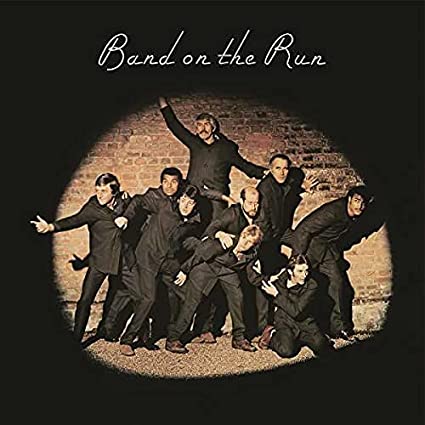 Band On The RunOff to Africa with just Linda and Denny Laine, Paul made the classic Wings album. Took me a while to get into this, but it is now one of my fave off all time. Q magazine placed “Band on the Run” at number 75 in its list of the "100 Greatest British Albums Ever". In 2012, it was listed at 418 on Rolling Stone's list of "the 500 Greatest Albums of All Time". Jon Landau in Rolling Stone described the album as being "with the possible exception of John Lennon's Plastic Ono Band, the finest record yet released by any of the four musicians who were once called the Beatles". In 2013, Band on the Run was inducted into the Grammy Hall of Fame. It reached No. 1 in the UK and USA, as well as Australia. Q magazine placed “Band on the Run” at number 75 in its list of the "100 Greatest British Albums Ever". In 2012, it was listed at 418 on Rolling Stone's list of "the 500 Greatest Albums of All Time". Jon Landau in Rolling Stone described the album as being "with the possible exception of John Lennon's Plastic Ono Band, the finest record yet released by any of the four musicians who were once called the Beatles". In 2013, Band on the Run was inducted into the Grammy Hall of Fame. It reached No. 1 in the UK and USA, as well as Australia. Side one: "Band on the Run" – 5:12", Jet" – 4:09, "Bluebird" – 3:23, "Mrs. Vandebilt" – 4:40, "Let Me Roll It" – 4:51 Side two: "Mamunia" – 4:51, "No Words" – 2:35, "Picasso's Last Words (Drink to Me)" – 5:49, "Nineteen Hundred and Eighty-Five" – 5:28 |
 Venus And MarsContinuing the commercial success of "Band On The Run", the Venus and Mars album came out in May 1975. Paul's fourth album since leaving the Fab Four. "Listen to What the Man Said" came out as a single prior to the album, and helped get "Venus" to the No.1 spot in both the U.S. and England. With a full line up again, the album received mainly good reviews, although a few considered it inferior to the "Band On The Run". There was still quite a bit of anti Paul feeling around at the time. On this album, McCartney decided to link the album's songs together much like the Beatles had on the Abby Road album to give Venus and Mars a more continuous feel. Also on this record, Paul had Jimmy McCulloch sig a song, Jimmy's composition "Medicine Jar. And, Denny Lane gets to sing "Spirits of Ancient Egypt" Side one: "Venus and Mars" – 1:16 "Rock Show" – 5:35" Love in Song" – 3:04 "You Gave Me the Answer" – 2:15 "Magneto and Titanium Man" – 3:16 "Letting Go" – 4:33 Side two: "Venus and Mars (Reprise)" – 2:05 "Spirits of Ancient Egypt" – 3:0 4"Medicine Jar" – 3:37" Call Me Back Again" – 4:57 "Listen to What the Man Said" – 3:57 "Treat Her Gently – Lonely Old People" – 4:21 "Crossroads" – 1:00
|
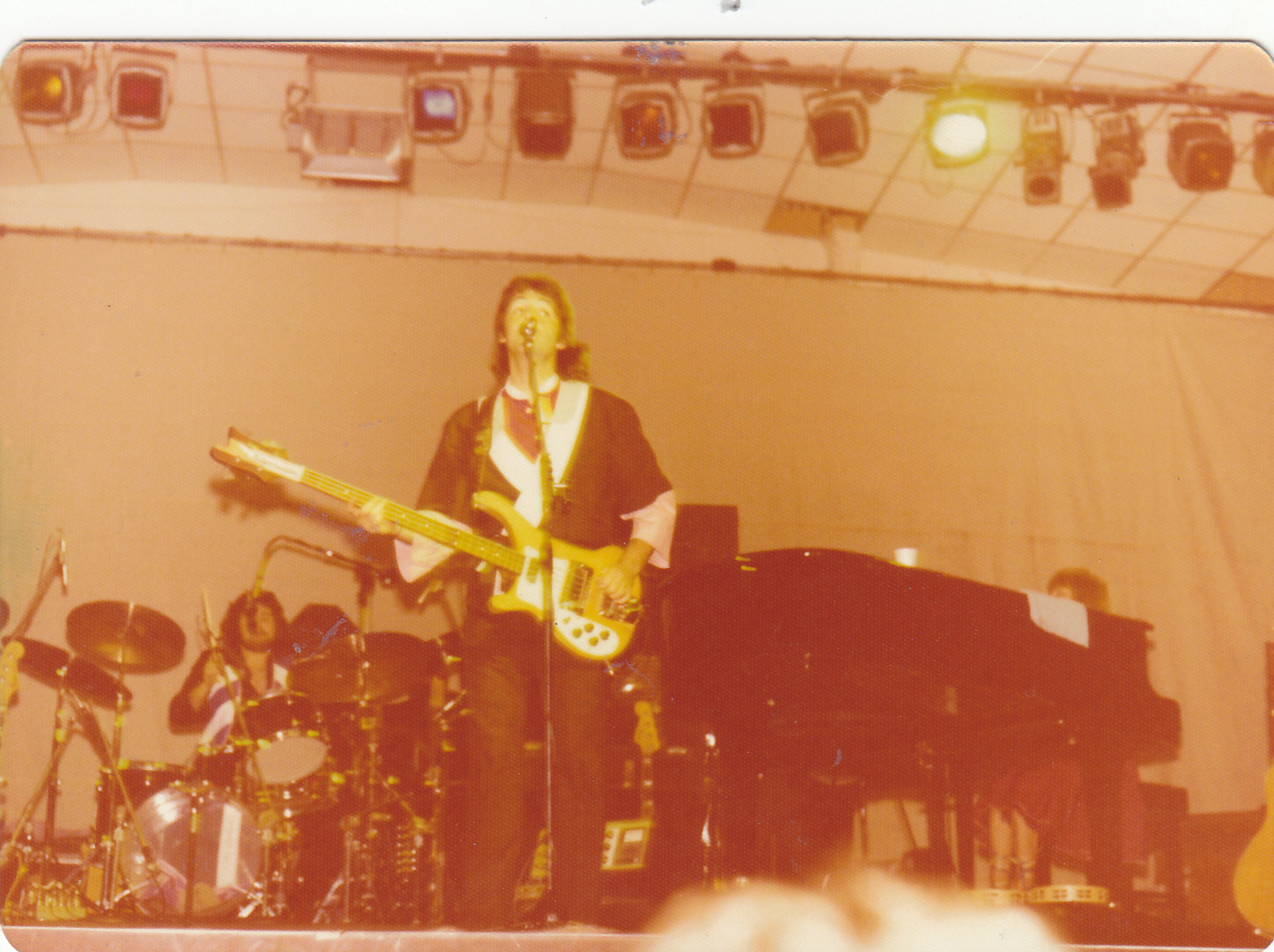 Paul McCartney getting into the opening song "Venus and Mars" at the Apollo Stadium, Adelaide, November 1975.
Paul McCartney getting into the opening song "Venus and Mars" at the Apollo Stadium, Adelaide, November 1975.Paul McCartney, Apollo Stadium, November 1975
Paul McCartney brought Wings down under in 1975. I was at my record shop when my friend Allan Fryer, ( formerly with Adelaide band Soldier, and then US with Heaven) came rushing in telling me extra seats had just been released, did I want to go.
Did I !!
So Allan rushed it to town and grabbed our tickets. It was of course a great show, Paul in fine form with Denny Laine and brilliant drumming from Joe English
Enjoy this site? Share with friends!
Paul's "GOT BACK" Tour is ON!
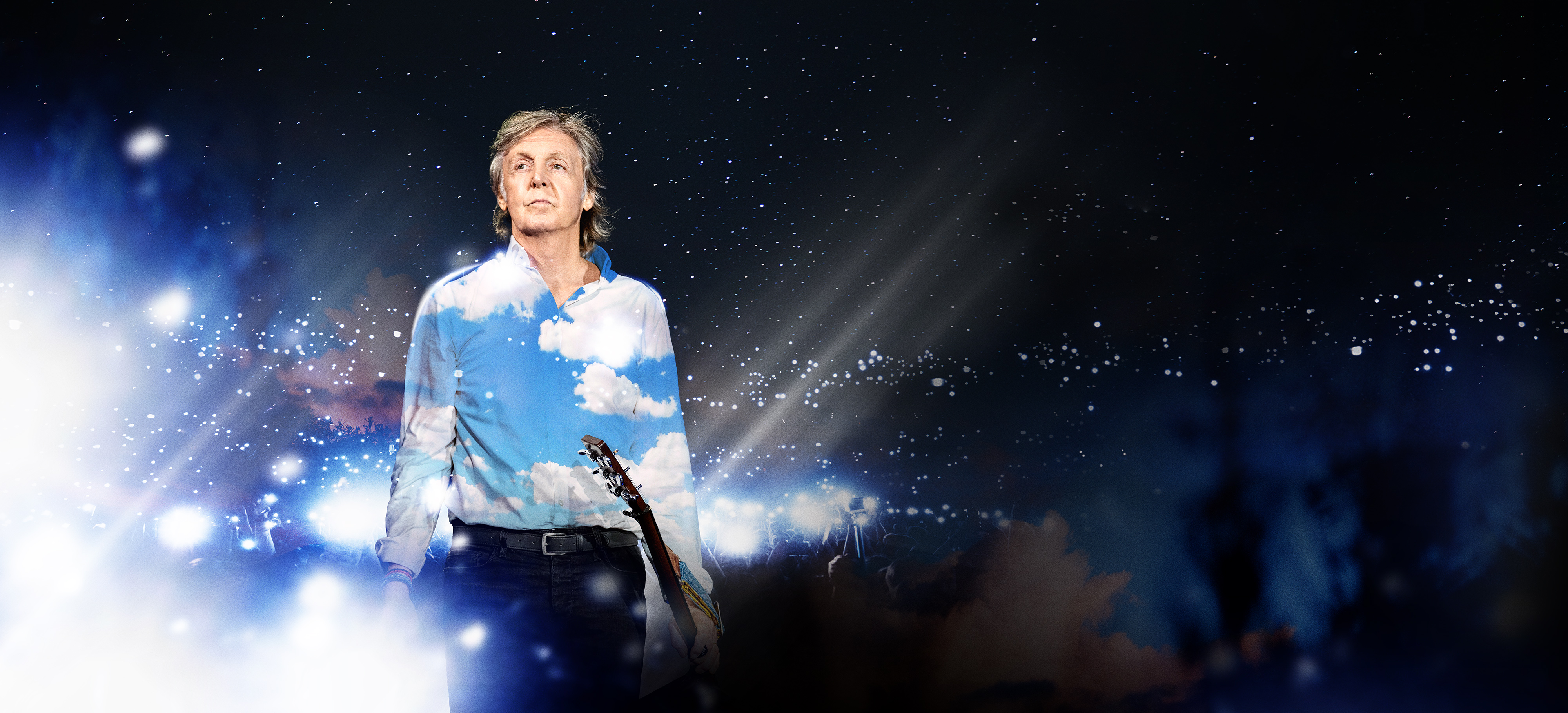
“I said at the end of the last tour that I’d see you next time. I said I was going to get back to you. Well, I got back!”—Paul McCartney.
Following more than a year of speculation, Paul McCartney today announces the GOT BACK Tour, a 13-city return to U.S. stages, kicking off April 28 with Paul’s first ever show in Spokane WA and running through to June 16 in East Rutherford NJ, where Paul will play MetLife Stadium for the first time since 2016.
GOT BACK will see Paul’s live debuts in Hollywood FL, Knoxville TN and Winston-Salem NC, his first Fort Worth TX and Baltimore MD shows since 1976 with Wings and 1964 with The Beatles, respectively, and his first Oakland CA date in 20 years. The tour will also include stops in cities where Paul has put in more recent yet no less unforgettable performances, including Boston MA, Los Angeles CA, Orlando FL, Seattle WA, and Syracuse NY.
GOT BACK marks Paul’s first series of live shows since his FRESHEN UP Tour wrapped in July 2019–its 39-date 12-country odyssey concluding with a triumphant sold-out show at Dodger Stadium in Los Angeles—a performance that instantly attained legendary status, generating rave reviews and Best of 2019 notices.
Paul will have his band Featuring longtime band - Paul “Wix” Wickens (keyboards), Brian Ray (bass/guitar), Rusty Anderson (guitar) and Abe Laboriel Jr (drums)
Tug of War Turns 40!
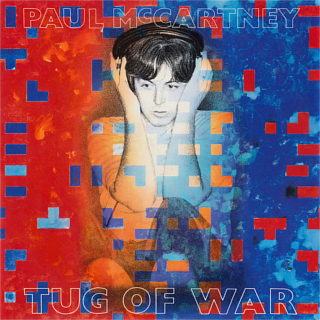
Tug of War, the third solo studio album by Paul McCartney, was released on 26 April 1982. It was his first album released after the dissolution of Wings the previous year, and his 11th album since the breakup of the Beatles. It was also McCartney's first album after the murder of John Lennon. The album was a number one hit in many countries, selling over one million copies in the United States in the year of its release, and over 4 million copies worldwide. Many critics praised it as a return to form for Paul, after much criticised earlier works. Tracks included the classic duet with Stevie Winder “Ebony and Ivory”, “Take It Away”, “Get It” with Carl Perkins and the title track “Tug Of War”. The album sounds just as good today as it did 40 years ago. Of course having George Martin produce the album, and having guest musicians like Eric Stuart, *10cc) Ringo, Steve Gadd, (drummer extraordinaire), and Stanley Clarke helped as well!
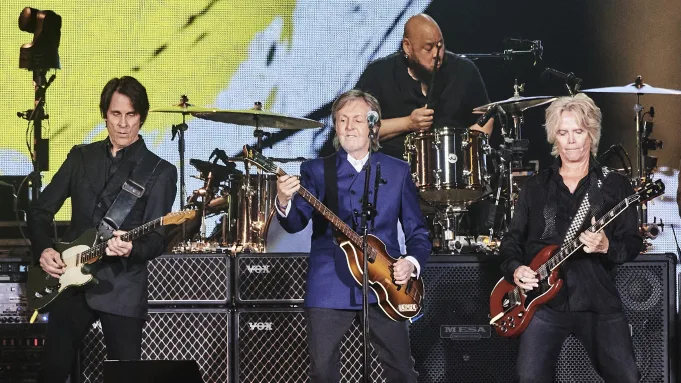 Paul McCartney, with his Hofner Violin Bass on stage in L.A, with Rusty Anderson, Abe Laboriel Jnr, on drums, and Brian Ray.
Paul McCartney, with his Hofner Violin Bass on stage in L.A, with Rusty Anderson, Abe Laboriel Jnr, on drums, and Brian Ray.Paul Hits L.A.
Paul McCartney is back with a vengeance! On Friday May13 at Los Angeles So Fi Stadium Paul and band delivered a blistering two and a half hour set with no fewer that 36, yes 36 songs!! Now Paul is hitting 80, so one wonders how long he can keep wowing audiences of 60,00o people for over 2 hours. So, maybe some of the high notes he can't hit as he used to, but no one minds. Paul takes no short cuts.
In the set are old favorites "Getting Better", "We Can Work It Out", "Get Back" and the wonderful "You Never Give me Your money", "She Came In Through The bathroom Window".
Ably supported by his now regular band of Rusty Anderson (guitar), Brian Kay,(guitar and bass guitar) long time sideman Paul "Wix" Wickens, and drummer Abe Laboriel (who does a fine Gene Kelly during "Dance Tonight) it was a night like no other.
"Red Rose Speedway"
Half Speed Re Mix.

Wings’ second album, Red Rose Speedway, was released in the United States on 30 April 1973.
Red Rose Speedway was the follow-up to 1971’s “Wild Life” being released in the UK on 4 May 1973.
Now released as a limited edition half-speed mastered vinyl LP, the 50th Anniversary pressing became available from April 22 for Record Store Day 2023, days before the actual anniversary of the album’s original release date. The first Paul McCartney and Wings album to top the US album chart, Red Rose Speedway kicked off a run of No. 1 albums that included “Band On The Run”, “Venus And Mars”,” At The Speed Of Sound” and “Wings Over America”. The album’s only single, “My Love,” was received with similar warmth, becoming Wings’ first #1 single in the US, as well as a staple of Wings and Paul shows for decades to come. This was the last album to feature Denny Siewell and Henry McCulloch who departed soon after, leaving Paul, Linda and Denny Lane to continue.
So what's so good about “Hals Speed Mastering”?
In essence, half-speed mastering results in a superior sounding record that is both richer and fuller in the low-mid frequencies, and smoother at the top-end. The stereo image is hugely improved and the overall sound is focused and engaging.
